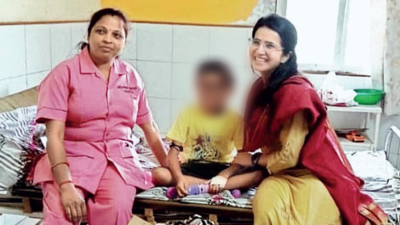Top Searches
- News
- City News
- vadodara News
- First paediatric hemodialysis centre proves to be boon for kids, parents
First paediatric hemodialysis centre proves to be boon for kids, parents

Urinary tract infections, Leaking of protein in urine, Blood in urine, Not being able to control urine, Bed wetting, Single kidney, Obstruction in pathway of urinary tract, Systemic disorders affecting kidneys
VADODARA: After celebrating Diwali with his young sister and parents, eight-year-old Om was all elevated. The next day he didn’t have to attend school. But little did he know what the future held for him. He started vomiting and suffering from pain in the abdomen after which he was admitted to the city-based Kashiba Children's Hospital (KCH).
He was diagnosed with atypical hemolytic uremic syndrome, a rare disease that involves kidney failure and breakdown of his own red blood cells. The good news, however, is that the little one has now recovered.
“In a population of million, we see 2 to 5 cases of atypical hemolytic uremic syndrome. Typical with this disease – a patient suffering from atypical hemolytic uremic syndrome – does not look sick. However, his medical reports are serious,” said Dr Jalpa Dave Shelat, paediatric nephrologist at KCH. “In the case of this boy, we counselled the parents patiently and explained the need for dialysis, plasmapheresis, and long stay at the hospital. Om’s parents were also counselled regarding it not being a simple stomach flu but a disease that required a long stay, plasmapheresis, dialysis, and various medications. With the hard work of doctors and team he was discharged after one month,” she said.
The hospital witnessed another six-year-old kid landing up in the hospital just a day after he celebrated his birthday. “He had accidentally ingested some toxic substance which made him comatose and it required four hemodialysis sessions to get him back to normal life,” she said. She said that the hospital has handled around 15 paediatric hemodialysis and plasma cases after starting Vadodara’s first exclusive paediatric hemodialysis facility – the Ilaben and Dr Arvind Shah pediatric hemodialysis unit.
“We also have facilities for peritoneal dialysis and kidney biopsy along with OPD services for the same and provide plasma filters and dialyzers at a very reasonable rate. If required, we make it completely free of cost for needy patients,” she said.
Kidney disorders in paediatric age groups are not uncommon but under-recognized.
“Just like adults, children can have kidney failure and require dialysis and kidney transplant. But a child is not a mini adult. He or she needs to be extra cautious,” she said, adding that early diagnosis and timely treatment can save the kidneys of little kids and prevent the need for dialysis.
He was diagnosed with atypical hemolytic uremic syndrome, a rare disease that involves kidney failure and breakdown of his own red blood cells. The good news, however, is that the little one has now recovered.
“In a population of million, we see 2 to 5 cases of atypical hemolytic uremic syndrome. Typical with this disease – a patient suffering from atypical hemolytic uremic syndrome – does not look sick. However, his medical reports are serious,” said Dr Jalpa Dave Shelat, paediatric nephrologist at KCH. “In the case of this boy, we counselled the parents patiently and explained the need for dialysis, plasmapheresis, and long stay at the hospital. Om’s parents were also counselled regarding it not being a simple stomach flu but a disease that required a long stay, plasmapheresis, dialysis, and various medications. With the hard work of doctors and team he was discharged after one month,” she said.
The hospital witnessed another six-year-old kid landing up in the hospital just a day after he celebrated his birthday. “He had accidentally ingested some toxic substance which made him comatose and it required four hemodialysis sessions to get him back to normal life,” she said. She said that the hospital has handled around 15 paediatric hemodialysis and plasma cases after starting Vadodara’s first exclusive paediatric hemodialysis facility – the Ilaben and Dr Arvind Shah pediatric hemodialysis unit.
“We also have facilities for peritoneal dialysis and kidney biopsy along with OPD services for the same and provide plasma filters and dialyzers at a very reasonable rate. If required, we make it completely free of cost for needy patients,” she said.
Kidney disorders in paediatric age groups are not uncommon but under-recognized.
“Just like adults, children can have kidney failure and require dialysis and kidney transplant. But a child is not a mini adult. He or she needs to be extra cautious,” she said, adding that early diagnosis and timely treatment can save the kidneys of little kids and prevent the need for dialysis.

About the Author
Prashant RuperaPrashant Rupera is special correspondent at The Times of India, Vadodara and reports on politics, business, heritage, and education. He has been regularly reporting on the dairy sector in Gujarat which pioneered the White Revolution in the country. His interests include reading, watching movies and spending time with family and friends.
Start a Conversation
FOLLOW US ON SOCIAL MEDIA
FacebookTwitterInstagramKOO APPYOUTUBE









